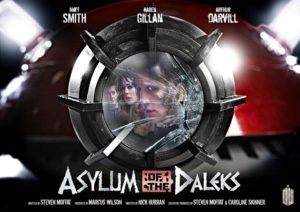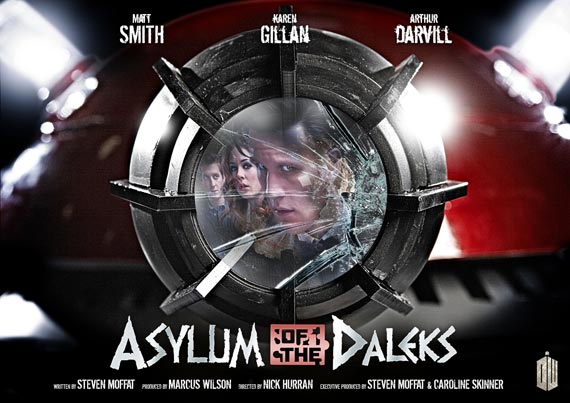Entering The ‘Asylum’
The seventh series of Doctor Who, seventh at least since the British fantasy/sci-fi classic programme’s 2005 revival, began last Saturday. (Yes, here there will be only a few slight spoilers.) I have a few observations after I viewed the first episode in glorious HD, thanks to Amazon video-on-demand. You likely have even more thoughts and/or praises.

- Amy’s and Rory’s relationship is central to series 7’s opener “Asylum of the Daleks.” Who knew helping their marriage could be as vital as saving the universe? What does that say about stories’ big, huge, epic battles versus personal ones?
- After the end of series 6, the Doctor does seem less famous throughout the universe. Somehow despite being outside of time, many believe he’s in the “past,” having died in the year 2012. But as this episode proves, there’s one notable exception. How do you feel about the Doctor being more “underground,” like Batman, rather than flying about all shiny and colorful in broad daylight, such as Superman?
- Did you catch the surprise guest? He/she is certainly earlier than expected, and announced. “Rule number one: the [showrunner, i.e., Steven Moffat] lies.” Did you find that storyline similar to River Song’s in “Forests of the Dead”? How does that lead you to expect this character’s inevitable (p)re-appearance later?
- Note the not-so-subtle fan-service. For years cosplayers have dressed as Daleks, with various interpretations. Now humans-as-Daleks are “canon.” Check out those Dalek-ish costumes. What did you think? Ever do any Doctor Who cosplay?
- This series is actually half a series, this year. Last year’s midseason break was a few months; this time it’s a whole year. Negative: much longer to wait until more new episodes. Positive: they seem to be using up a whole year’s effects budget on half a year’s stories, each one of which intentionally resembles a blockbuster film. What do you think of this approach, and the more-independent and less arc-based stories?
Finally, one crucial truth about Doctor Who seems to refer to all stories’ reflections of love.
I noticed this upon recently reviewing series 1’s two-part story “The Empty Child” and “The Doctor Dances.” That’s the one with the creepy little boy in the gas mask, and secondly with the introduction of “omnisexual” character Captain Jack Harkness. Ha ha! That Captain Jack. He’ll shag anything carbon-based. Regardless of gender. Ha, ha ha. Funny Captain Jack!
But ask yourself: on what kinds of love is the actual and fantastic story based?

Spoiler: there’s an asylum. And Daleks.
Meanwhile, “Asylum of the Daleks” is about not only Daleks, but Amy’s and Rory’s love for one another. By contrast, another infamous Doctor Who throwaway-suggestive line hints that one new character has experimented with “bisexuality” or lesbianism. But that’s all. One throwaway line, for a cheap, agenda-laden laugh. Compare that to the whole story being about “traditional,” that is God-created, marriage and love, being worth preserving.
“Different” sexuality: good for cheap agenda-smacking laughs. Real love powers the story.
Captain Jack is comic relief. But his crushing on Rose, while comedic, adds emotional pull to his divided loyalties. And a mother’s love for her child is what reduced audiences to tears.
Viewers may chuckle at hints of “bisexuality.” But they will only cheer for Rory and Amy.
So gayness/whatever can apparently function only as comic relief. You can’t build the story around such an imposter “love.” Not a great story. Not a story people will love. Shouldn’t this say something about how we see love in reality? If it’s not a beautiful thing worth celebrating in imagined worlds, why do we try to trick ourselves in the real world?










































Good post, and thank you for being non-spoilery!
I was at DragonCon this past weekend and saw a ton of DW cosplayers, including an amazing array of Tardis dresses, and no two alike. Came across a blog post with a bunch of cool pics of these people: http://dw-cosplay.livejournal.com/1413787.html
To clarify about the new companion’s cameo, in this story, her name was Oswin. The companion’s name is Clara. It’s Doctor Who tradition to have the new companion do a cameo appearance earlier on. (Amy’s cameo was the Mount Vesuvius episode–she’s one of the girls with a painted face, but her red hair gives her away.) If Clara and Oswin are the same person, I’ll be surprised, but I’m not discounting Moffat’s mad genius.
I liked the human Dalek costumes, with all the rivets and things all over it. I told my hubby I want to cosplay as a Dalek now.
Also, Amy and Rory’s marriage problems had me all choked up. Those two get me every time. It was almost as bad as that episode in season 6 when Amy gets stuck in the time-prison for 30 years.
I do look forward to the new companion, though. If she’s as spunky as her cameo, she’ll be a good match for the Doctor.
“Pointy chin!”
“What’s wrong with my chin?”
“Careful, you’ll put someone’s eye out with that.”
It’s not *actually* Doctor Who tradition to have the actor cameo. When Karen Gilliam did the early series 4 episode, she had not been cast for series 5 – AFAIK they hadn’t even cast Matt Smith yet. Ditto for Martha’s ‘cameo’ as her cousin Adeola in series 2 – pretty sure she had not yet been cast as Martha.
I believe it’s more related to the fact that there are only about 10 British actors of each gender in all of existence… 😉
Also, the name Clara has not been confirmed by the production team – it’s only what people who have been spying on production have heard, which is an unreliable source. (There could be a reason that makes sense in context why she’s using the name Clara…)
So I feel like everything is still very much up in the air, and I absolutely cannot wait until Saturday.
Ah, you are my hero for today! I am looking forward to seeing what replies show up. And just because Stephan went without spoilers, doesn’t mean I will, although I will warn.
Amy’s and Rory’s relationship is central to series 7’s opener “Asylum of the Daleks.” Who knew helping their marriage could be as vital as savingthe universe? What does that say about stories’ big, huge, epic battles versus personal ones?
I don’t know if you’ve seen the prequels, but the way they progress from humorous snapshots to heartbreaking is wonderful in a MOFFAT! way. Viewers who had seen those went in informed about the Ponds.
But the idea that small things can be just as important as new ones goes throughout the series–the First Doctor rescued someone from a crashed colonial ship, and I’m sure there’s other classic examples that don’t come to mind right now.
As for new series
woman: And I know we’re not important…The Doctor: Who said you’re not important? I’ve travelled to all sorts of places, done things you can’t even imagine. But… you two… street corner, two in the morning. Getting a taxi home. I never had a life like that. Yes, I’ll try to save you.
–Father’s Day, Ninth Doctor
Donna: I’m nothing special, I’m a temp.
Rose: Donna Noble, you’re the most important woman in the whole of creation.
–Turn Left, season four
Atraxi: Is this world important?
The Doctor: “Important?” What’s that mean, “important?” Six billion people live here; is that important? –The Eleventh Hour, Eleventh Doctor
The Doctor: Who’s she
Karzan Sardick: Nobody important
The Doctor: Nobody important? Blimey, that’s amazing. You know that in nine hundred years of time and space and I’ve never met anybody who wasn’t important before.
–A Christmas Carol, Eleventh Doctor
He says that–and I think he really means it. And small things can be as significant as large things, not only because of how they can change the universe–witness the effects of Amy and Rory going with the Doctor on their wedding night–but because that small, ordinary life is the most important thing there is, what he’s fighting for. So I wasn’t surprised that Amy and Rory’s marriage was the thing that saved her, not at all.
***SPOILERS ***
that whole scene was brilliant, spilling into the open everything that fans have been thinking for ages–Rory’s love for Amy versus Amy’s treatment of Rory, the loss of Melody, all of it. It just felt like a sucker punch when Amy announced why she divorced him. And then I learned she signed the papers Amy Williams. Maybe it was all built up too fast, but that’s a limitation of TV. I think it would have worked better as a tie-in novel, but oh well.
***END SPOILERS***
And the one time he does go off this path, in Waters of Mars, is a terrifying thing to watch:
The Doctor: Adelaide, I’ve done this sort of thing before. In small ways, save some little people, but never anyone as important as you-oh, I’m good!
Adelaide: “Little people!?” What, like Mia and Yuri? Who decides they’re so unimportant!? YOU!?
2. After the end of series 6, the Doctor does seem less famous throughout the universe. Somehow despite being outside of time, many believe he’s in the “past,” having died in the year 2012. But as this episode proves, there’s one notable exception. How do you feel about the Doctor being more “underground,” like Batman, rather than flying about all shiny and colorful in broad daylight, such as Superman?
I like it. There are advantages and disadvantages to both options, but it’ll be interesting to see how long the Doctor can pull it off. And if he can’t resort to pulling his name out, what will he do with those enemies that can’t be scared off?
3. Did you catch the surprise guest? He/she is certainly earlier than expected, and announced. “Rule number one: the [showrunner, i.e., Steven Moffat] lies.” Did you find that storyline similar to River Song’s in “Forests of the Dead”? How does that lead you to expect this character’s inevitable (p)re-appearance later?
I have no idea what’s going to happen with said character–is it an early appearance or a relation? The tricky thing is that even when the Doctor meets this person, he won’t have appearance to make the connection for him.
4.Note the not-so-subtle fan-service. For years cosplayers have dressed as Daleks, with various interpretations. Now humans-as-Daleks are “canon.” Check out those Dalek-ish costumes. What did you think? Ever do any Doctor Who cosplay?
Well, compared to season three’s “Humanoid Dalek,” it is infinitely more frighting. Season three’s looked more like a squid head. Now the Daleks, in addition to their pepperpot terror, have the same factor as Autons–they can hide in plain view. Never done any cosplay, though, for lack of money.
5.This series is actually half a series, this year. Last year’s midseason break was a few months; this time it’s a whole year. Negative: much longer to wait until more new episodes. Positive: they seem to be using up a whole year’s effects budget on half a year’s stories, each one of which intentionally resembles a blockbuster film. What do you think of this approach, and the more-independent and less arc-based stories?
While I liked season six and the tight plot, I definitely think that the independent-based elements will help draw in viewers midseason, and is almost a necessity with a longer break than three months. The effects are better this way, true, but anyone who’s seen classic who–the bubble-wrap monsters of Ark in Space come to mind–will be less concerned about the effects. But the breaks……agg! Ten months between Wedding of River Song and Asylum was bad enough, but this is really annoying
Spoilers ahead.
The relationship between Amy and Rory is my favorite thing in the Moffat era. But honestly, I don’t like the way it was handled in this episode. It didn’t make any sense. It’s not because they were having marriage tro
uble or almost got divorced, although that’s sad in itself. But rather, the clips of them in the earlier parts don’t match the motivations they are revealed to have later in the episode. Amy claims that the reason for the divorce is that she wanted to free Rory so he could have children. So, if that’s all, why does she act like a complete selfish diva in the beginning? There isn’t much reason for it, other than the fact that Moffat wanted to shock his audience by making the tension between them really filled with hate. It’s a case of going for reaction vs. accurate story-telling.
As for the bisexuality, I have no reason to believe Oswin is bisexual. The only thing I remember her saying is that her first crush was on a girl named Nina because she had been going through a phase. It’s a *very* common phase for little girls to go through to get “crushes” on other little girls before they start liking boys (when I was 7, my first “crush” was on a girl named Sarah. ), and even the super pro-gay rights and pro-gay everything psychologists freely admit that it has absolutely nothing to do with bisexuality or homosexuality. Many, many straight women can remember going through that phase. And seeing as most people get their first crush at a very young age, there aren’t any sexual feelings attached to such “crushes”.
I think it’s really cool about the human-to-Dalek twist. I never thought about it being a fanservice, though. Especially since we had Human Daleks back in Season Three. It’s pretty much the same as that, only in reverse.
We’ll have to wait and see if Oswin is really the Doctor’s new companion or not. It could go a variety of ways. It is possible that the rumored companion “Clara” could be some ancestor of Oswin, and not Oswin herself. I really really liked Oswin, so I hope she is the companion after all. But at the same time, it seems a bit dull that Moffat would pull the same story twice, since he’s already done this sort of thing with River.
I’ll add to the whole divorce thing:
Amy is not an emotionally stable individual at all. In addition to the whole multiple timelines in her head thing (parents/no parents growing up), she was held for at least eight months in a secret lab connected to a ganger in which she was poked, prodded, and forced to give birth; her baby was forcibly taken from her; the next time she saw that baby and knew it, she was older than Amy; and to top it off, the Silence ensured that she could never give birth again.
I think that Amy’s reaction is selfish in a way because she is using her inability to have children as a shield for all of the other messy stuff in her head – and she would rather be the one who walks out rather than allow Rory the chance to do it.
It’s the one fact of their relationship that both of them believe that the other is too good for them. So she would rather come out as the one who leaves rather than the one who is left, because she’s sure he will.
Losing a child is hard. Losing a child *and* becoming infertile is even harder. To have both happen during the emotional and physical trauma of being locked up by baddies who did who knows what to her… yeah.
So I am not surprised that their marriage became very strained. I’m glad they got back together. 🙂
Sorry, this wasn’t meant to be a reply to you, Izzy… hit the wrong button. 🙂
As far as the gay/bisexuality thing – I’m not really sure what you’re trying to get at. TBH, this is more a reflection of Moffat’s writing than anything else… there were no throwaway lines in series 5, IIRC, about bi or gay relationships – according to an interview, he was told after series 5 that he needed to step it up for (basically – you’d have to read the interview) political correctness issues.
Even over in Sherlock, he has repeated in interviews that Johnlock is not canon. Gay relationships are just not Moffat’s thing. (A Good Man Goes to War had a couple of gay characters in it but it’s sort of grey and vague – I only understood because half the adult fandom was going on about it over on Tumblr. IMO, Moffat just doesn’t like/isn’t good at writing it.)
So, as far as I could tell, that was a required throwaway line because that’s what the BBC expects them to do.
I’m not sure how this reflects on the episode’s portrayal of love. It would be really freaky if they suddenly started confirming crack slash ships – in addition to being out of place for DW, and pretty inappropriate, it would be out of the blue. It had to be about Amy and Rory because series 5 and 6 were about Amy and Rory.
And Captain Jack is a big mess of a character, mostly attributed to RTD’s gay activism stance… I like Jack because he’s a complex character with interesting motivations, but RTD’s gay activism stance pushed the character in directions I won’t go (one of the many reasons I don’t want to watch Torchwood right now)
So, I’m rather confused at what you were trying to say.
My main point wasn’t to question why they put those innuendos into the story. Instead I pointed to this truth: you can’t build a story, not a great story, on that kind of imposter “love.” Politically correct “love” redefinition and is only good for cheap wink-wink-nudge-nudge laughs, or at best, guilt-laden agenda-pushing. But you can’t ground an emotionally involving story in it and have people cheer for that love, as people cheered for the mother/child relationship in “The Doctor Dances” or Rory’s and Amy’s love from series 5 onward.
Hm, well, you’ve not met any slash fans then. I know at least one person who actively cheer on ships like Johnlock, Destiel, etc. – ships where I don’t see anything besides platonic love (which does admittedly drive the story) – and get very emotionally involved.
I don’t agree with the slash fans, but I will say that a platonic love between two characters of the same gender can drive a store. See: Sam and Frodo.
Completely different than a throwaway jab.
That’s why I added the qualifier: a great story. And by “imposter love” I don’t mean great friendships between two men or two women. I mean fake, masquerading romantic love. It doesn’t propel the most classic, transcendent, mythical stories.
I’d like to see an example of ‘fake, masquerading romantic love’ in a story…
(For the record, I’m not defending the homosexual lifestyle in any way. I believe that while there may be some biological basis, it’s probably much like depression – something psychologically wrong that isn’t the fault of the person – and it’s what you choose to do with it that matters. I’m open to changing my perspective but prefer to do it through experience with people in real life rather than debating semantics and theoretics.)
TBH I don’t see a lot of difference between platonic love and romantic love driving a story if physical contact (outside of appropriate cultural boundaries) is not part of the picture. (“Greater love has no man than this, to lay down his life for a friend” and all that) But I’m rather inexperienced so I could be just not noticing things.
I chose not to read the post until I’ve seen the episode… but wanted to thank you for mentioning how you saw the episode. I will be seriously considering Amazon for my Doctor Who fix, now that I don’t have cable!